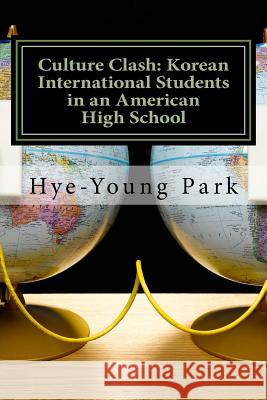Culture Clash: Korean International Students in an American High School: English Language Only! » książka
Culture Clash: Korean International Students in an American High School: English Language Only!
ISBN-13: 9781530480357 / Angielski / Miękka / 2016 / 250 str.
Culture Clash: Korean International Students in an American High School: English Language Only!
ISBN-13: 9781530480357 / Angielski / Miękka / 2016 / 250 str.
(netto: 296,72 VAT: 5%)
Najniższa cena z 30 dni: 307,31
ok. 16-18 dni roboczych.
Darmowa dostawa!
Key words: Foucault's neoliberal governmentality and genealogy of homo-economicus, the man of enterprise (entrepreneur), Human capital, Early study abroad (Chogi Yuhak) as a transnational strategy, Korean education and English fever, English-only, Educational migration and globalization, Culture clash, Asian model minority and yellow peril, Christianity and capitalism, Linguistic imperialism and hegemony of America
Grade-obsessed Koreans, Listen
English-Only, No Korean
Fragile Civility: an Evangelical American School Meets Korean International Students in the 21st Century
Based on five years of ethnographic research, the book examined the cross-national clash that emerged when a Midwestern Christian high school, Joshua High School, predominantly white, enrolled escalating numbers of Early Study Abroad Korean teenagers.
The tensions among U.S. teachers and students and Korean internationals at the school resulted in the promulgation of English-Only and guardianship policies (i.e., students had to be residing with a parent or an official guardian). In examining these policies, she discovered uncomfortable and considerable incompatibilities between the school's staff and leadership, and the educational and social goals and expectations of the Korean students and their parents.
She argues, however, that a veneer of civility obscured these diverging perspectives from surfacing explicitly. The tensions were complicated by linguistic, religious, racial/ethnic differences, as well as class, citizenship, and identity issues. The resulting experiences suggested that neither the Korean families nor the school staff were prepared for the conflict that ensued.
The largest and rapidly growing numbers of "international students" in U.S. institution of elementary, secondary, or higher education at all levels pose opportunities, as well as significant challenges, both within the academic settings and in the larger communities.
In light of the urgency and growth of these concerns, this book presents considerable possibilities and obstacles relative to understanding how language exists in a cross-national context. It particularly focuses on the importance of language, in particular the emergence of English as today's lingua franca, in terms of integration as opposed to assimilation.
Researching the culture clash, this book aims at fostering the possibility of integrating international students through a rigorous analysis of the close proximity between the two groups while maximizing the understanding of the intensity of the conflicts-tensions and frictions.
This book is unique in that:
(1) It is highly pertinent to today's scene because of the growing numbers of international students that are expected to enroll in U.S schools and schools worldwide.
(2) It is about international students, especially K-12, which has received relatively little attention in academic publishing.
(3) The author is a former international student and current scholar with a focus on transnational Korean issues in the U.S.
(4)The credibility of the research is enhanced by its adoption of a broad, interdisciplinary methodological toolkit to address transnational contact, race/ethnicity, language, culture, class, nationality, and identity as inextricably interconnected phenomena in an era of globalization.
(5) It is a longitudinal ethnographic study that crosses national borders. This book is based on five years of interviews with and observations about students, their parents, and educators from both groups both at and outside the school (in the U.S. and in Korea).
(6) It contains both micro- and macro-analytic theoretical foundations to support assertions and claims related to the implementation of policies on the part of the school to remedy the culture clash.
Zawartość książki może nie spełniać oczekiwań – reklamacje nie obejmują treści, która mogła nie być redakcyjnie ani merytorycznie opracowana.











